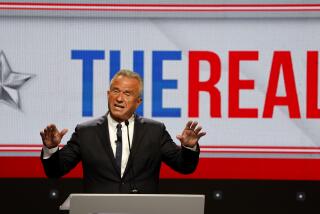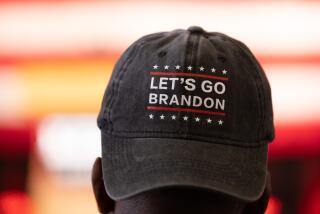Bradley Follows Own Path, but Some Say He Risks Getting Lost
With just a month left before the critical March 7 primaries, Bill Bradley’s determination to run a presidential campaign on his own terms has left him in the precarious position of balancing his lofty philosophy with the gritty realities of the race.
While his promise of a “new politics” may have garnered him headlines when he first launched his bid, Bradley’s rhetoric may not be resonating with voters more interested in more tangible concepts. And his focus on running “a different kind of campaign” stalled his defense maneuvers in the thick of the primary season, just when he needed to be at his most nimble.
As Bradley works his way across the country this week toward California, hefaces the gargantuan task of building energy for a campaign that seems conflicted about the direction it should take, analysts say.
For months, deeply absorbed in his desire to talk to voters about “a world of new possibilities,” Bradley absorbed the punches Al Gore threw but refused to hit back.
“He wanted to run a very uplifting campaign,” said David Doak, a Democratic strategist. “Along with the high-mindedness, there was some naivete that he could get away with it. When someone is going to kick the hell out of you, you’ve got to fight.”
Big Themes May Be Out of Step
Now that he has dug in his heels and hit back, Bradley is facing criticism for attacking Gore’s integrity and potentially alienating the very voters attracted by his positive message.
But the bigger problem may be bigness itself: By tackling epic issues, such as race relations and tendering a $65-billion overhaul of the nation’s health-care system, Bradley may simply be out of step with an electorate that seems more interested in incremental change and preserving the status quo.
“He’s running a campaign about big ideas and the future, and I’m not sure that’s where the American public is right now,” said Fred Yang, a Democratic pollster who is sitting out the party primary. “It’s like at the beginning of ‘Star Trek’ when Capt. Kirk says he will boldly go where no man has gone before. They like it right here, right now just fine.”
A recent Washington Post-ABC News survey suggested a problem Bradley could face on a national scale. Asked what they wanted from their next president--”big, new ideas” or “small, steady steps”--7 in 10 preferred small steps.
Strategy Seen as Risky but Worth Struggle
“Incrementalism is the nature of American politics today,” said Walter Zelman, who learned the hard way as one of the architects of the Clinton administration’s failed 1993 health-care plan. “Bold ideas get criticized. They’re risky.”
But Anita Dunn, a longtime Bradley aide now serving as a senior campaign strategist, said the former senator from New Jersey came away from 18 years in Congress believing “it’s equally difficult to do small thing as it is to do big things.
“So if you’re going to put the effort into the fight,” she concluded, “you might as well make it one that’s really worthwhile.”
Gina Glantz, Bradley’s campaign manager, insists that voters around the country will respond to Bradley’s ambitious agenda.
“He presents a fresh start, someone who is an insurgent who is looking to tell the truth about politics,” she said. “I think he is clearly tapping into people’s interests and desires about what they want for their country.”
When he announced his candidacy, Bradley said as president he would seek to bring about a “deeper prosperity . . . that makes us feel rich inside as well as out.”
And he laid out goals as clear-cut as they were far-reaching: “We can reduce childhood poverty. We can increase the number of Americans with quality health care. We can mute the voice of big money in our elections. And we can put in place long-overdue gun control.”
But happy voters are not likely to rally to that kind of grand-scale change. And Democrats this year seem very happy: Surveys conducted among voters in Iowa and New Hampshire found overwhelming approval of President Clinton’s job performance, and the vast majority of those expressing contentment awarded their votes to Clinton’s loyal vice president.
“People aren’t looking for big change,” said Al From, whose Washington-based Democratic Leadership Council has been vital in nudging the party toward the center. “People want step-by-step change.”’
Caught up talking about his principles and ambitious goals, Bradley’s timing has sometimes seemed out of step with the realities of the campaign.
For months, as he asked voters, “What is your dream?” he failed to take advantage of the early disarray in Gore’s camp or respond to the vice president’s attacks on his health care plan, many strategists say.
“Bradley clearly had an opening, but his message was far too narrow,” said political analyst Charles Cook. “It was a lofty, intellectual message that was terrific for professors and college kids.”
One of Bradley’s weaknesses, Cook said, is that he appears overconfident in his own approach, unable to recalibrate.
“He does things his own way,” he said. “It’s difficult to convince him any other way is right.” Eventually, after urging from supporters such as Sen. Bob Kerrey (D-Neb.), Bradley shot back at Gore during a debate in New Hampshire, launching a more aggressive line of attack that he has maintained--more or less--since then.
Often, however, Bradley’s offensives seem misdirected.
During a massive rally in New York the day after the New Hampshire primary, Bradley demanded an apology from Gore for an incident days earlier in New Hampshire.
Gore supporters, Bradley said, insulted Kerrey when he showed up at an event, calling him “a cripple” and splashing mud on the Vietnam veteran who lost part of his leg in the war.
But the next day, Kerrey issued a statement saying that Gore was not responsible for the incident and did not owe him an apology.
Bradley aides insist that his new offensive is in line with his overarching promise for a “new politics,” saying that he is just defending himself and pointing out “Gore’s distortions.” It is a strategy, they say, that is working.
“People are becoming increasingly concerned about who can win in November,” Glantz said. “I think the vice president has some vulnerabilities that people are recognizing.”
But some analysts say there appears to be a general ambivalence in the Bradley campaign about maintaining the drumbeat on Gore.
Doak said Bradley should have continued to hammer the vice president on his abortion record, which Bradley raised in New Hampshire but has said little about since. And, he added, the candidate has done little to exploit Gore’s slim 4-percentage-point win in New Hampshire in the week since the primary there.
“I would have sharpened the attack on Gore and made some news,” he said. “He doesn’t have time to waste. It’s time for Bradley to get moving.”
Bradley plans to spend the next four weeks targeting New York and California, which most political watchers agreed he has to win in order to keep his candidacy alive. In these places, his platform of campaign finance reform, gun control and maintaining a woman’s right to choose will play well, aides said.
Candidate Keeps His Own Counsel
This week, however, as Bradley hopes to get a lift going into the final round of campaigning, Republican candidate John McCain is dominating the headlines.
Meanwhile, there is no indication that Bradley will shift away from his early message that he marches independently, that he does what he thinks is right and not necessarily popular.
“He comes to this very much from his own travels throughout the United States over the last two years and his firm belief that a huge part of this nation wants to move forward,” Dunn said. “And it’s his belief that in order to move forward, we need to address some of the things that have not been addressed over the last decade and to do so in a big way.”
If he’s wrong, said Dunn, summing up what has been Bradley’s take-it-or-leave-it approach, “Then he won’t be elected president.”
More political coverage. A18
More to Read
Get the L.A. Times Politics newsletter
Deeply reported insights into legislation, politics and policy from Sacramento, Washington and beyond. In your inbox three times per week.
You may occasionally receive promotional content from the Los Angeles Times.











